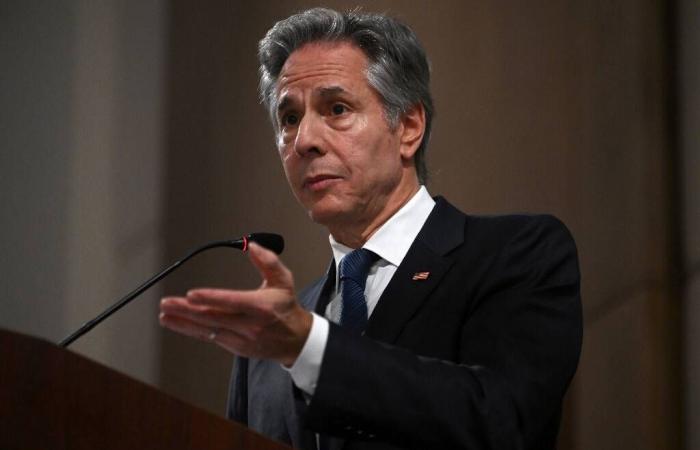Turkey, a major player in the conflict in Syria and support of the new authorities, has also reopened its embassy in Damascus after more than 12 years of closure.
Traffic police under the new authorities were deployed on Saturday to the streets of the capital, where municipal workers are cleaning the roads. Most businesses have reopened, including the famous al-Hamidiyé souk in old Damascus, according to AFP correspondents on site.
“We need to quickly revive activity in the souk,” says Amjad Sandouq, a trader. “The regime has fallen, but the State has not fallen, thank God.”
“Syrians themselves”
Following an 11-day offensive, a coalition of rebel factions led by the radical Sunni group Hayat Tahrir al-Sham (HTS) captured much of the country from government forces on December 8, ending a half-year -century of power of the Assad family.
HTS, led by Abu Mohammad al-Jolani, claims to have broken with jihadism but remains classified as “terrorist” by several Western capitals, including Washington.
“We have been in contact with HTS and other parties,” Blinken told reporters after discussions on Syria in Aqaba, Jordan.
He did not give further details on the circumstances of these exchanges but when asked if the United States had had a direct link, he replied: “Direct contact, yes.”
POOL/AFP / ANDREW CABALLERO-REYNOLDS.
Mr. Blinken specified that this contact was notably part of efforts to locate Austin Tice, an American journalist kidnapped in 2012 at the start of the civil war in Syria.
Mr. Blinken was wrapping up a regional tour that took him to Türkiye, Iraq and Jordan, countries neighboring Syria.
In Aqaba, Mr. Blinken participated in discussions bringing together Arab, European and Turkish diplomats which he said would lead to a joint declaration affirming: “We agreed that the transition process must be led and controlled by the Syrians themselves and achieve an inclusive and representative government.”
“Peaceful transition”
“The rights of all Syrians, including those of minorities and women, must be respected. Humanitarian aid must reach the people who need it,” he added.
Also present in Jordan, Geir Pedersen, the UN special envoy for Syria, called for work to avoid “the collapse of Syrian institutions”, and the foreign ministers of eight Arab countries to lead a transition “peaceful”.
Faced with concerns from the international community, the new Prime Minister in charge of the transition until March 1, Mohammad al-Bashir, promised this week a rule of law and to “guarantee the rights of all”.
In Damascus, Turkey reopened its embassy on Saturday in the presence of the new head of mission Burhan Koroglu, according to an AFP journalist.
The chancellery closed in March 2012, a year after the start of the civil war in Syria, triggered by the repression of pro-democracy demonstrations, and after calls from the Turkish government for the resignation of Mr. Assad.
Israeli bombings
Since 2016, Turkey has exercised considerable influence over northern Syria, maintaining relations with HTS which launched its offensive against power from Idlib (northwest), its stronghold.
“United, united, united, the Syrian people are united,” has become the leitmotif of Syrians since Mr. Assad fled with his family to Russia.
But the jubilation is accompanied by the painful quest of Syrians who are looking for their loved ones who disappeared during the decades of repression by Assad, accused of the worst abuses.
Several armed groups and international powers have been involved in the war in Syria, which has left more than half a million dead, pushed some six million Syrians, or a quarter of the population, to flee, and fragmented the country.
The leader of HTS, Ahmad al-Chareh, Jolani by his nom de guerre, denounced on Saturday the incursion of Israeli troops into the south of the territory after the fall of Assad but affirmed that his country was too “exhausted” by the war to engage in a new conflict.
Lebanese Hezbollah said it hoped that the new authorities would not normalize their relations with Israel, the sworn enemy of the pro-Iranian Shiite movement. He further indicated that his movement, which notably brought in its weapons via the Syrian-Lebanese border, could no longer be supplied via Syria.
Israel, Syria’s southern neighbor, carried out new strikes on “military sites of the former regime” in Damascus and its suburbs, destroying a scientific institute and a “military airport”, according to the Syrian Observatory for Human Rights. man (OSDH).
The strikes also targeted “ballistic missile warehouses” and rocket launchers in Qalamoun, on the outskirts of Damascus, the OSDH added.
These raids aim to “destroy what remains of the military capabilities of the next Syrian army”, according to the Observatory.






